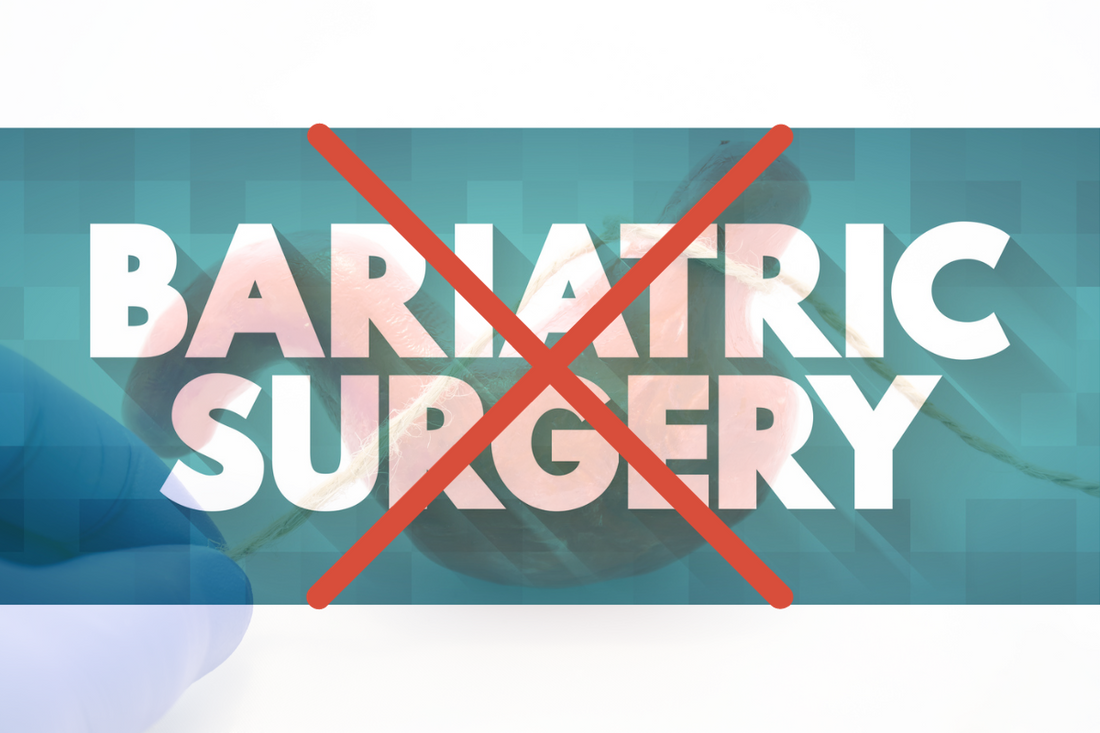Table of Contents
- Pre-Existing Factors For Not Getting Bariatric Surgery
- Not Meeting Medical Criteria to Qualify
- Pre-Existing Smoker / Tobacco Consumer
- Pre-Existing Substance Abuse Problems
- Can't Pass the Psychological Evaluation
- Pre-Existing Severe Health Conditions
- Personal Reasons to Not Have Bariatric Surgery
- Unwilling to Change Lifestyle Habits
- Planning to Become Pregnant
- Unrealistic Expectations Post-Surgery
- Not Having Enough Money or No Access to Financing
- Potential Long-Term Health Risks To Not Get Surgery
- Potential for Ulcers
- Potential for Infections
- Possibility of Compromised Absorption
- Potential for Nutrient Malabsorption
- Post-Surgery Mental Health Issues
- Other Reasons Not to Consider Bariatric Surgery
- Disadvantages of Bariatric Surgery
- Frequently Asked Questions
- What are the common complications of bariatric surgery?
- Are there any long-term risks associated with bariatric surgery?
- What are the potential side effects of weight loss surgery?
- Who may not be a suitable candidate for bariatric surgery?
- What are the disadvantages of undergoing bariatric surgery?
- What are the leading causes of death after bariatric surgery?
Bariatric surgery has become increasingly popular for those looking to lose weight quickly and easily. While it may seem like the perfect solution to improve your health, there are several reasons why you should think twice before undergoing this procedure.
One significant reason to reconsider bariatric surgery is the risk of complications. Like any surgery, there are inherent risks involved, and with this particular type of procedure, the risks can be even greater, including blood clots and infections. You should also keep in mind that bariatric surgery is not a guaranteed solution and may require additional follow-up surgeries or even regaining the weight you lost initially.
Factors For Not Getting Bariatric Surgery

Not Meeting Medical Criteria to Qualify
If your body mass index (BMI) isn't sufficient, you may not qualify for bariatric surgery. Generally, a BMI of 40 or higher is required for metabolic surgery, or a BMI of 35 with obesity-related health issues. Insurance companies also have specific criteria, which may vary, so check with your provider.
Pre-Existing Smoker / Tobacco Consumer
If you're a smoker or consume tobacco products, you may need to quit before becoming eligible for bariatric surgery. Tobacco use increases the risk of complications and hinders the healing process. Most surgeons require patients to be tobacco-free for several months before surgery.
Pre-Existing Substance Abuse Problems
Substance abuse issues, such as alcohol or drug addiction, can interfere with adherence to post-surgery guidelines and increase the risk of complications. It's essential to address any substance abuse problems before considering bariatric surgery.
Can't Pass the Psychological Evaluation
Bariatric surgery requires significant lifestyle changes, which is why medical professionals require a psychological evaluation is key to determining a patient's readiness. You may not pass the psychological evaluation if you struggle with certain mental health issues or aren't prepared for the emotional challenges post-surgery.
Pre-Existing Severe Health Conditions
Certain severe health conditions could make bariatric surgery risky or less effective for you. Conditions like advanced liver disease, severe heart disease, or other obesity-related complications might disqualify you from undergoing the procedure. Discuss these concerns with your healthcare provider to determine if bariatric surgery is appropriate for your situation.
Personal Reasons to Not Have Bariatric Surgery

Unwilling to Change Lifestyle Habits
Bariatric surgery can be helpful for weight loss, but it requires lifestyle changes that you must commit to. You'll need to alter your eating habits, engage in regular physical activity, and attend follow-up appointments. If you're unwilling to commit to these changes, bariatric surgery may not be suitable for you.
Planning to Become Pregnant
If you're planning to become pregnant within the next year, bariatric surgery may not be advisable. Post-surgery, your body needs time to adjust and stabilize your weight loss. Pregnancy during this period could affect your health and your unborn child's. It's best to wait at least 18 months after surgery before trying to conceive.
Unrealistic Expectations Post-Surgery
Bariatric surgery can help you decrease your BMI and overall weight; however, it's essential to maintain realistic expectations. While some patients lose significant weight, others may lose less. Age, starting weight, and commitment to lifestyle changes can affect your results. Keep in mind that surgery isn't a magic solution; it's part of a longer weight loss journey.
Not Having Enough Money or No Access to Financing
Bariatric surgery can be expensive, and your insurance company may not cover the full cost. Before deciding on surgery, consider the financial implications and whether you can afford the procedure and any additional costs, such as:
- Pre-surgery tests
- Post-surgery medications
- Nutritional counseling
- Follow-up appointments
Explore financing options if necessary, and ensure you're financially prepared for the commitment bariatric surgery entails.
Potential Long-Term Health Risks To Not Get Surgery

Potential for Ulcers
Bariatric surgery can significantly increase your risk of developing ulcers. The alteration in the digestive tract can make your stomach more susceptible to acidic irritation and ulceration. To prevent this complication, you may change your eating habits significantly and take medications as prescribed by your healthcare provider.
Potential for Infections
Infections are a common concern following any surgical procedures, including bariatric surgery. Wound and internal infections can occur, requiring further treatment and possibly leading to additional complications. Adhering to proper aftercare guidelines and promptly notifying your healthcare provider of any signs of infection is essential to minimize this risk.
Possibility of Compromised Absorption
Bariatric surgery can impact your body's ability to absorb nutrients from food. This could result in long-term complications such as vitamin deficiencies, anemia, and osteoporosis. To counteract these effects, you may need to take vitamin and mineral supplements and maintain a well-balanced diet based on specific recommendations from your healthcare provider.
Potential for Nutrient Malabsorption
Following bariatric surgery, you might experience nutrient malabsorption that can lead to deficiencies in essential nutrients like vitamins, calcium, and other minerals. Consequently, this may increase your risk of developing health issues like anemia, weak bones, and impaired immune function. It's crucial to closely monitor your nutrient levels and follow a specific diet plan tailored to address these potential deficiencies.
Post-Surgery Mental Health Issues
It's important to recognize that bariatric surgery can affect not only your physical health but also your mental health. Weight loss and lifestyle changes might contribute to feelings of anxiety, depression, or body dysmorphia. Working closely with a mental health professional throughout your weight loss journey can help ensure that you're managing these challenges effectively.
In summary, it is essential to carefully weigh the potential long-term health risks associated with bariatric surgery against the benefits. Consulting with your healthcare provider and considering your specific health conditions and needs can help you make an informed decision.
Other Reasons Not to Consider Bariatric Surgery
When considering bariatric surgery, weighing the pros and cons is essential. Beyond the usual concerns about surgical risks and post-surgery lifestyle changes, additional factors might make you rethink undergoing this surgical treatment.
One concern with bariatric surgery is the potential for complications such as leaks or blood clots. Leaks from the surgical wound can lead to infections that require additional treatment. Blood clots can form and travel through your bloodstream, posing a serious risk to your health. Additionally, surgery-related anxiety can contribute to overall stress levels and affect your mental well-being.
Another potential issue after bariatric surgery is the altered appearance of body parts, such as breasts and thighs. Significant weight loss can lead to excess skin, which might necessitate further plastic surgery to achieve the desired look. Not all insurance plans provide coverage for these additional procedures, which can be financially burdensome.
Furthermore, undergoing bariatric surgery can profoundly impact your bone health. Rapid weight loss might result in decreased bone density, increasing your risk of fractures. Discussing this risk with your surgeon and considering ways to mitigate potential bone loss is important.
In conclusion, when evaluating whether bariatric surgery is the right choice for you, consider the potential benefits and these additional factors. Understanding the full scope of the surgical treatment will help you make an informed decision based on your unique situation.
Disadvantages of Bariatric Surgery
While bariatric surgery can be a life-changing procedure for those struggling with morbid obesity, it is essential to consider its disadvantages. One potential drawback is the risk of long-term complications. After weight-loss surgery, such as gastric bypass or sleeve gastrectomy, you may experience issues like leaks in the surgical connections or rapid weight loss, leading to malnutrition and vitamin deficiencies. It is crucial to adhere to a strict diet and take prescribed vitamins to minimize these risks.
Another factor to keep in mind is the potential for emotional turmoil after bariatric surgery. Some patients experience depression and anxiety due to the significant lifestyle changes, the inability to enjoy certain foods, or the constant need to monitor calorie intake. Additionally, when losing weight rapidly after surgery, excess skin may develop, which can lead to body image issues and the need for further surgery to remove the excess skin.
It is also essential to understand that bariatric surgery is not a quick fix. Procedures like Roux-en-Y gastric bypass, gastric banding, and biliopancreatic diversion require dedication and commitment to a healthier lifestyle. You will need to make changes in eating habits, exercise routines, and overall self-care. Additionally, there may be persistent cravings for unhealthy foods that you must learn to manage.
Finally, surgical complications can arise during the recovery period. Proper wound care is crucial to prevent infections and promote healing. Diarrhea or dumping syndrome, where food moves too quickly from the stomach to the small intestine, may occur, leading to uncomfortable cramping and increased bathroom visits.
It is crucial to weigh the pros and cons of bariatric surgery and have realistic expectations regarding the recovery process and long-term maintenance before deciding on this life-altering procedure. Consult your healthcare provider to discuss your options and ensure you are well-informed about the risks and benefits.
Frequently Asked Questions
What are the common complications of bariatric surgery?
There can be various complications following bariatric surgery. Some of these complications may include infections, blood clots, hernias, and leakage in the gastrointestinal system. Make sure to discuss these risks with your surgeon before making a decision.
Are there any long-term risks associated with bariatric surgery?
Yes, long-term risks can occur after bariatric surgery. These may include vitamin and mineral deficiencies, gallstones, bowel obstruction, and dumping syndrome. To mitigate these risks, following your healthcare provider's advice and adhering to the prescribed diet and supplement regimen is essential.
What are the potential side effects of weight loss surgery?
Potential side effects can vary depending on the type of surgery. Some common side effects include nausea, vomiting, diarrhea, and constipation. Moreover, you might experience changes in appetite, food tolerance, and emotional changes due to rapid weight loss. Communicating with your healthcare team to manage and alleviate these side effects is crucial.
Who may not be a suitable candidate for bariatric surgery?
Not everyone is a suitable candidate for bariatric surgery. Individuals with certain medical conditions, untreated mental health disorders, or substance abuse issues might not be ideal candidates. Additionally, those unable or unwilling to make long-term lifestyle changes may not be suitable for this surgery. It's important to consult with a medical professional to determine your eligibility.
What are the disadvantages of undergoing bariatric surgery?
Some disadvantages of bariatric surgery include the risk of complications, the need for lifelong dietary modifications, and the possibility of weight regain. In addition, it can be costly, and not all insurance plans may cover the procedure. It's essential to weigh the pros and cons carefully and consider alternative weight loss methods before surgery.
What are the leading causes of death after bariatric surgery?
Although rare, there are some potential causes of death following bariatric surgery. These may include pulmonary embolism, infection, bleeding, and complications related to anesthesia. Ensure you choose an experienced surgeon and follow post-operative care guidelines to minimize these risks.
Also Read: Bariatric Surgery Risks: Complications You Need To Know



 Order Free Sample
Order Free Sample





